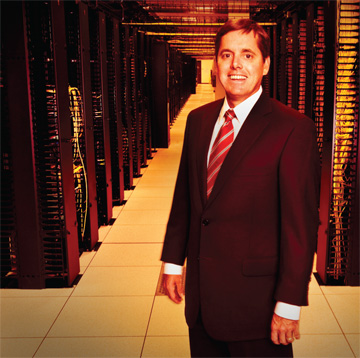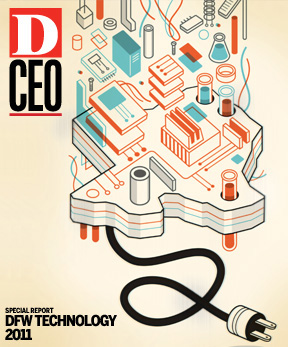Back in the day, circa 1980, the information technology outsourcing playing field was full of rivalry and cutthroat competition. North Texas-based Electronic Data Systems, Perot Systems, and Affiliated Computer Services were all fierce contenders in the quest to help companies go global by outsourcing their key IT services.
These days the giants are still vying for a chunk of an $800 billion outsourcing industry, but the rivalry has matured. Derrell James, group president of information technology outsourcing services at ACS in Plano, describes the atmosphere as more amicable and less antagonistic.
“It’s more of a family or friendly environment,” James says. “Most of the people are like me and they’ve worked at all three companies. So when we’re sitting across the table, you know the person you’re competing against.”
Such is the incestuous world of IT outsourcing. It all started with Ross Perot, who founded EDS in 1962. After selling it to General Motors in 1984, he formed Perot Systems in 1988.
All three of the once-local outsourcing behemoths have been through recent mergers. EDS is now HP Enterprise Services, Perot Systems is called Dell Services, and ACS added “a Xerox Company” to its moniker. Through it all, the three have maintained large operations here, employ thousands of white-collar workers, and have attracted a large support industry of consultants.
One of the most recent developments to rock their worlds is President’s Obama’s plan to add more than 32 million people to the health care rolls and invest more than $20 billion for medical record technology.
Health care information technology generated about half of Perot Systems’ revenue before the merger in November 2009, and Dell also has a large health care practice, says Berk Smith, vice president of Dell Healthcare and Life Sciences Services in Plano.
“When we heard about the stimulus package to drive technology adoption in health care, we did a back flip,” he says. “That is the exact core of our business. We’re a systems integrator so we don’t write software, we integrate IT, connect it, operate it, and train [customers] how to use it.”
Exciting Times
Dell Services is seeing an uptick in payor business as states and insurance agencies change they way they process medical information. The company serves more than 200,000 physicians, 50 percent of all U.S. hospitals, and seven out of 10 health care systems in the country. “We’ve got so much transformation going on over the next 10 years,” Smith says. “The impact on the delivery of care to bring it to more people and the higher quality of care is just going to be unbelievable.”
Health care technology also is one of ACS’ largest business lines. The company is one of the country’s leading Medicaid claims processors, counting Texas and California as clients. It also works with payors such as Aetna, James says.
A growing area of IT services is in what’s called cloud computing, where customers “rent” infrastructure from a third party. Cloud is popular with industry sectors such as high tech and investment banking, where there is a high level of trust for technology. Trust is important because with cloud computing you don’t know where the data is or where it’s running. The global cloud computing market is expected to grow from $47 billion in 2008 to $126 billion by 2012, according to IBM, another industry competitor.
Industries such as health care might be slower to embrace cloud computing, but many predict it won’t be long before health care is on board. That’s because once electronic medical records are created, the next big challenge is where to store the massive amounts of data they generate, Smith says. Both ACS and Dell Services says they are developing products to address these needs.
“What’s going on in health care is not sustainable,” Smith says. “Health care will be 17.3 percent of [the nation’s gross domestic product] next year, and it has tripled since 1990.
“Technology is going to be a key player in driving efficiency into that model.”






